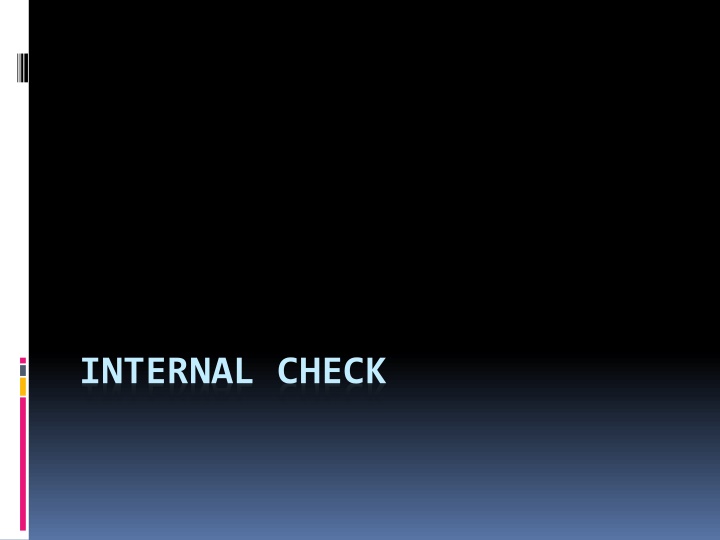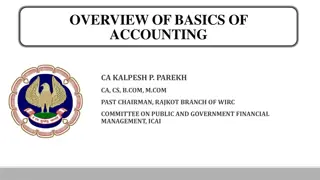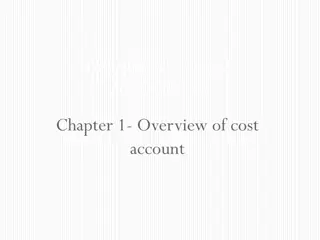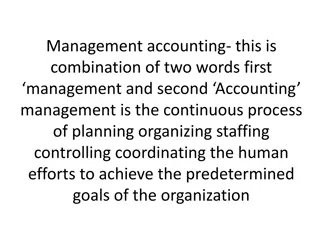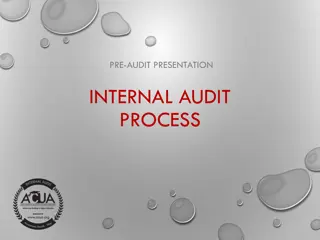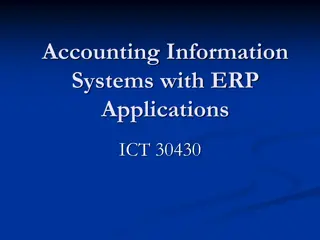Internal Check in Accounting
Internal check in accounting is a crucial procedure to ensure accuracy and prevent fraud by involving multiple employees in the handling and verification of routine transactions. This system divides work among staff, assigns specific duties, and emphasizes the importance of careful selection, training, clear instructions, well-defined authority, proper division of work, and regular rotation of duties for effective control and supervision.
Download Presentation

Please find below an Image/Link to download the presentation.
The content on the website is provided AS IS for your information and personal use only. It may not be sold, licensed, or shared on other websites without obtaining consent from the author.If you encounter any issues during the download, it is possible that the publisher has removed the file from their server.
You are allowed to download the files provided on this website for personal or commercial use, subject to the condition that they are used lawfully. All files are the property of their respective owners.
The content on the website is provided AS IS for your information and personal use only. It may not be sold, licensed, or shared on other websites without obtaining consent from the author.
E N D
Presentation Transcript
Meaning: Internal check is an accounting procedure where by routine entries for transaction are handled by more than one employee is such manner that the work of one employee is automatically checked against the work of another for detection of errors and irregularities. It is an arrangement of the accounting duties under which the work of one person comes under the scrutiny of another person so that it is not possible to commit fraud without collusion (secret agreement) between two or more persons.
Features: The work is divided among the staff members in such way that all the duties are distributed among the different staff members, and each staff member is assigned a specific duty. The work is assigned to the staff members according to the qualifications, area of specialisation, training, experience ability etc. Each staff member is held liable for any error or irregularity in the task assigned to him. The work done by one staff member is checked independently and automatically by another. The checking is carried out continuously as a part of the routine system.
ESSENTIALS / FUNDAMENTAL PRINCIPLES OF SOUND INTERNAL CHECK SYSTEM Careful selection and training: All the employees of the concern should be carefully selected and well- trained for the job to be performed by them. Clear-cut instructions in writing: Clear-cut instructions about each job should be given to each and every employee in black and white so that every employee clearly understands the work to be done by him. Well-defined authority: The authority, duties and responsibilities of each member of the staff of the business concern should be clearly defined. There should be clarity of thought to every staff about the work to be performed by him.
Assignment of duties: Each member of the staff should be assigned that job for which he is best fitted (suited) according to his ability, qualification and experience. Proper division of work: The work should be distributed among the member of the staff in such a way that no single person is allowed to do any particular work alone. Independent and automatic checking: The duties to be performed by each individual should be devised in such a way that the work done by him should be independent and automatically checked by another individual simultaneously.
Regular rotation of work: There should be regular rotation of members of the staff form one work to another or for one department to another so that he will not able to indulge in any misappropriation owing to lengthy service on job. Effective control and supervision:All purchases, receipts and issue of goods should be checked by a supervisor with a view to controlling them properly as these are these are the areas where irregularities could be done very easily to deceive the employer. Daily deposit of cash received: The entire cash including cheques and drafts received from the customers should be deposited daily into Bank Account of the concern.
Strict control and vigilance: Major assignments like verification and valuation of stock, sales, payments of wages, etc. should be under strict vigilance and control. Regular verification of cash balances: There should be a system of checking the cash and bank balances by a responsible officer at regular intervals as chances of committing frauds are very high in this area. Use of labour- saving devices: Labour-saving, and time-saving mechanical devices such as cash register, calculating machines, cash counting machines, time-recordings clocks, mobile phones ,laptops, etc. should be used to improve efficiency of the employees in their respective area of work.
Safety of important documents: Proper attention should be paid for the safe custody of important documents such as title deeds of assets held, investments made in securities, Debenture Trust Deed, unused blank share certificates and cheque books. Simplicity:The system of internal check to be implemented in the organization should be simple and can be easily understood by all the member of the staff to make it workable and effective and to avoid any ambiguity (confusion) which may creep in later on. Economical: The internal check system should not involve heavy investment by the business concern on its implementation other words, it should be economical for business organization. The benefits derived by the concern should always be more than the amount invested on its implementation.
